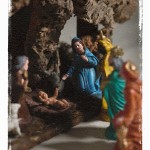 One of the gifts the Magi brought the baby Jesus was myrrh, a substance used for embalming. The gift was a potent foreshadowing of the sacrificial death on a cross that was Jesus’ destiny.
One of the gifts the Magi brought the baby Jesus was myrrh, a substance used for embalming. The gift was a potent foreshadowing of the sacrificial death on a cross that was Jesus’ destiny.
Thursday night I went to a Christmas party with my wife’s family. At the party I spoke with my wife’s cousin who, a year ago, was diagnosed with a very aggressive form of pancreatic cancer.
He has been a believer for as long as I can remember, but last night there was something different about him.
As he prayed over the food his voice cracked with emotion, as if he was talking to a very dear friend and could not express his love in mere words.
He told me his doctors had informed him that even though surgery, chemotherapy and radiation had eliminated any trace of the cancer from his body, there was a 80 to 90% chance the cancer would return within 12 to 18 months.
I was reminded of the Apostle Paul who wrote about having to live with a “sentence of death” hanging over him. Paul was convinced it had happened “that we might not rely upon ourselves but on God who raises the dead.” (2 Cor. 1:9).
We live on the false assumption we will not die. In reality we are all dying; it’s just that some people don’t acknowledge it until a doctor tells them.
We would all live better lives if we acknowledged we were dying. The specter of death can birth a live-giving perspective. Just ask Ebenezer Scrooge. My wife’s cousin is more alive now than he has ever been.
Jesus lived the three years of His earthly ministry with the knowledge He was going to be killed. He lived with a sentence of death that was proclaimed symbolically by the magi when He was but a boy. And yet, Jesus lived the most effective life man has ever known.
So, I know it’s a little odd to talk about death during Christmas, but I believe embedded in the Christmas story is a message that, like our Savior, we should live like we are dying. GS

